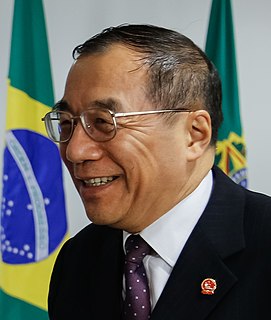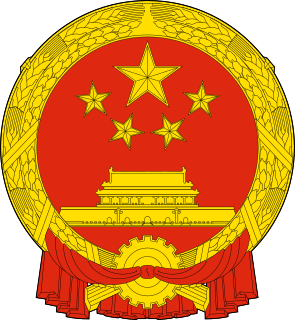The 16th National Congress of the Communist Party of China was held in Beijing between November 8th and 14th, 2002. It was preceded by the 15th National Congress of the Communist Party of China. 2,114 delegates and 40 specially invited delegates attended this and elected a 356-member 16th CPC Central Committee, as well as a 121-member Central Commission for Discipline Inspection (CCDI). The Congress marked the nominal transition of power between Jiang Zemin and Hu Jintao, who replaced Jiang as General Secretary, and a newly expanded Politburo Standing Committee line-up. The institutional transition would be completed in state organs by the 2003 National People's Congress in March. Jiang, however, remained head of the Central Military Commission, therefore in practice, the power transition was not complete. The Party National Congress examined and adopted the amendment to the Constitution of the Communist Party of China proposed by the 15th CPC Central Committee, and decided to come into force as from the date of its adoption. An amendment to the Constitution was approved the Party National Congress, with Jiang Zemin's signature ideology of "Three Represents" written into it. This congress was succeeded by the 17th National Congress of the Communist Party of China.

The Central Commission for Discipline Inspection (CCDI) is the highest internal control institution of the Communist Party of China (CPC), tasked with enforcing internal rules and regulations and combating corruption and malfeasance in the Party. Since the vast majority of officials at all levels of government are also Communist Party members, the commission is in practice the top anti-corruption body in China.

Huang Xingguo was the Mayor of Tianjin, and, between 2015 and 2016, the acting Communist Party Secretary of Tianjin. Huang is originally from Zhejiang province, and previously served as party chief of Ningbo, and the party chief of Taizhou. In 2016, he was investigated by the Central Commission for Discipline Inspection and subsequently expelled from the Communist Party of China for breaking party regulations. He was sentenced to 12 years in prison upon being convicted on charges of bribery.
Ma Wen is a Chinese politician, currently serving as the Chair of the National People's Congress Internal and Judicial Affairs Committee. Previously served as Minister of Supervision between 2007 and 2013. She also headed the National Bureau of Corruption Prevention.
Zhao Hongzhu is a retired Chinese politician and previously a member of the Communist Party of China's national leadership. Zhao served as the Deputy Secretary of the Central Commission for Discipline Inspection (CCDI), the Communist Party's anti-corruption agency, as well as a Secretary of the Central Secretariat.
Su Shulin is a Chinese oil and gas executive and former politician. Between 2011 and 2015, he served as Governor of Fujian province, on China's eastern coast. Before beginning his political career, Su served as the Vice-President in the state-owned PetroChina Company Limited. He later became chief executive of Sinopec Group. In 2011, Su was named Governor of Fujian. He was investigated by the Central Commission for Discipline Inspection in 2015 and subsequently expelled from the Communist Party of China for violating organizational discipline. He was sentenced to sixteen years in prison upon being convicted on charges of bribery and abuse of power.
He Yong is a retired Chinese politician. A military hardware technician by training, He rose through the ranks of the party in the 1980s, and joined the supervision and anti-corruption system in the 1990s. He served as the Minister of Supervision, as well as Deputy Secretary of the Central Commission for Discipline Inspection, the top anti-corruption body of the party. Between 2002 and 2012, He was a member of the Secretariat of the Communist Party of China.
Liang Bin is a former Chinese politician from Shanxi province. He spent most of his career working in his home province, successively serving as the Party Secretary of the cities of Shuozhou and Xinzhou, before being transferred to Hebei province in June 2008 to head the party's provincial Organization Department. Liang was investigated by the Communist Party of China's anti-graft agency in November 2014.

The Central Leading Group for Inspection Work is a coordination body set up under the Central Committee of the Communist Party of China for the purpose of managing party disciplinary inspections nationwide.
The 16th Central Commission for Discipline Inspection (CCDI) was elected at the 16th National Congress of the Communist Party of China on 15 November 2002. Its 1st Plenary Session elected the Secretary, deputy secretaries and the 16th Standing Committee of the CCDI.
Wang Wei is a Chinese politician. He spent a major part of his career at the Central Commission for Discipline Inspection. In 2013, Wang was named the deputy director of the office in charge of the Three Gorges Dam project.
Du Jincai is a retired general of the People's Liberation Army who served as Secretary of the Commission for Discipline Inspection of the Central Military Commission. He was also Deputy Secretary of the Central Commission for Discipline Inspection (CCDI), and a member of the CCDI Standing Committee.
Huang Xiaowei is a Chinese politician currently serving as the chairman of the provincial committee of the Chinese People's Political Consultative Conference of Shanxi province.
Huang Kunming is a Chinese politician, currently serving as the head of the Propaganda Department of the Communist Party of China and a member of the Politburo of the Communist Party of China. He joined the Propaganda Department in 2014 as a deputy head. Prior to his appointment he served in Fujian and Zhejiang provinces, and is considered a close associate of Xi Jinping, current General Secretary of the Communist Party of China. He was the one time Communist Party Secretary of Hangzhou.
Chen Wenqing is a Chinese politician currently serving as the Minister of State Security of the People's Republic of China. Previously, he was the minister of the Deputy Secretary of the Central Commission for Discipline Inspection (CCDI), the Communist Party's top anti-graft body, a member of the CCDI Standing Committee.
Wu Yuliang is a Chinese politician, serving since 2011 as Deputy Secretary of the Central Commission for Discipline Inspection (CCDI), the leading anti-graft body of the Communist Party of China.

Yang Xiaodu is a Chinese politician, the Director of the National Supervisory Commission, and a member of the Politburo of the Communist Party of China. He has served in Shanghai and Tibet during his early political career. Since 2014, he has also been a Deputy Secretary of the Central Commission for Discipline Inspection (CCDI), the leading anti-graft body of the Communist Party of China.
Zhang Jun is a Chinese politician and former judge, serving currently as the Procurator-General of the Supreme People’s Procuratorate, and the Minister of Justice. He formerly served as Vice Minister of the Ministry of Justice of the People's Republic of China and Vice President of the Supreme People's Court. He is also a regular contributor for Project Syndicate.
He Jiatie is a Chinese politician. A senior discipline official responsible for carrying out the anti-corruption campaign in China, He was investigated for breaching party discipline in 2016, and demoted to department-level. He was accused of leaking secrets related to party inspection work.
Yao Zhongmin is a Chinese economist who served as chairman of the board of supervisors at China Development Bank (CDB) from 2008 to 2013. He had also served as deputy chief of the Communist Party of China (CPC) committee at the CDB and vice governor of the bank. In June 2016 he was put under investigation for alleged "serious violations of discipline" by the Central Commission for Discipline Inspection (CCDI). He was soon removed from membership of the Chinese People's Political Consultative Conference. In September 2016 he had been expelled from the Communist Party of China and removed from public office. In October 2016 the Supreme People's Procuratorate announced that authorities were investigating accusations of corruption against him. In August 2017, he was sentenced to 14 years for accepting bribes by the Intermediate People's Court of Baoding City.









